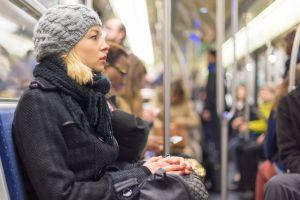Millions of Americans are exposed to noise pollution every day that causes hearing loss and a host of other health conditions. Find out how to reduce noise pollution and preserve your well-being. 2018 909 Noise pollution causes hearing loss and affects health https://www.healthyhearing.com/report/47496-Noise-pollution-hearing-loss
A screaming child, TV blaring in the living room, a vacuum cleaner, loud music coming from your teen’s bedroom: a busy home can be a source of constant noise. Once you step outside, there’s even more noise pollution. On an average day, you may hear your neighbor’s lawn mower, honking cars, sirens, maybe even ear-shattering sounds of a construction or a work site – a saw, a drill, a jackhammer.
Even your morning commute can be full of noise pollution that can harm your health.
Welcome to the modern – and very noisy – world. Unless you live in a very quiet rural area, you are no stranger to the phenomenon of environmental noise, commonly called noise pollution.
Noise pollution is often referred to as the “modern unseen plague” for good reason. It may be unseen but certainly not unheard! It disturbs us practically everywhere we go, day and night. And, besides leading to hearing loss, it impacts our physical and mental health in more ways than one.
A clear and present danger
World Health Organization (WHO) is just one of many groups that sounds an alarm about the dangers of noise pollution. “Excessive noise,” the WHO warns on its website, “seriously harms human health and interferes with people’s daily activities at school, at work, at home and during leisure time.”
How big of a problem is this? According to the American Speech-Language-Hearing Association (ASHA), an estimated 30 million Americans are exposed to dangerous noise levels on a regular basis, an increase of 10 million from just a few years ago. And, of course, many millions more are impacted by noise pollution worldwide, so it is fair to say that environmental noise is a growing global problem.
And “problem” is the right word to describe these health and hearing effects of noise pollution:
Hearing loss
Tinnitus, also referred to as ringing in the ears
Sleep disturbances
Cardiovascular problems
Pain and fatigue
Poor work and school performance
Speech problems
Hormonal responses (stress hormones) and their consequences on human metabolism and immune system function
Causes of noise pollution
Here’s another alarming statistic: According to the U.S. Census Bureau, Americans cite noise as the biggest problem affecting their neighborhoods – even more than crime.
Nearly half of the entire population is regularly exposed to noise levels labeled as excessive by the Environmental Protection Agency.
What noises do people find most disturbing to their sense of hearing and overall well-being? A survey conducted several years ago among residents of Curitiba, a Brazilian city with the population of 1.6 million, showed that traffic was the number one culprit (73 percent), followed by noisy neighbors (38 percent).
It is not surprising that survey participants were most impacted by loud traffic since most urban sounds far exceed the 80 dB threshold. For example, a garbage truck registers at 100 dB, a car horn at 110 dB, and an ambulance siren at 120.
Overall, neighborhood noise was cited as the most disturbing type of noise, as all of the study participants indicated at least one of the items belonging to this category: neighbors, animals, sirens, construction, night clubs, toys and domestic electric appliances.
How did this entire ruckus affect the respondents? Irritability was the primary result of exposure to noise, followed by difficulty to concentrate (42 percent), sleeping disorders (20 percent) and headaches (20 percent).
These findings can be applied to any industrialized nation, including the United States. So the question is, what can you do to reduce noise pollution and protect your well-being?
Reducing noise pollution
There is a small but growing awareness of noise pollution and its effects on your health and hearing. Some organizations are dedicated to increasing the safety and silence in our noisy world. For example, Silencity is a New York City-based organization that raises awareness about noise pollution and seeks out restaurants and public spaces where city dwellers can enjoy a quiet, safe respite from the noise. UK-based Pipedown is dedicated to eliminating the annoying canned music we cannot escape when we dine and shop.
These are certainly laudable moves, and more tangible measures like them are needed in all the noisy urban centers. In the meantime, there are steps you can take to protect your hearing and health in general against harmful noise pollution. Better Hearing Institute advises these guidelines:
Know which noises can cause damage (those above 80 decibels), including jet engines, lawn mowers, motorcycles, chainsaws, powerboats, and personal stereos. If you have to raise your voice to shout over the noise to be heard by someone within an arm’s length away, the noise is probably in this range.
Since loud music is a well-known source of toxic noise, keep the volume of your personal audio equipment at a comfortably low volume and take frequent breaks from listening.
When involved in loud work or recreational activities, wear hearing protective devices (HPDs) such as earplugs or earmuffs. HPDs are required by law to be labeled with a Noise Reduction Rating (NRR) that is based on performance obtained under ideal laboratory conditions, so keep this in mind when shopping around. If you think you might have hearing loss, get tested and treated as soon as possible.
To learn more about hearing protection devices and to have your hearing tested, visit a hearing professional near you today to get started on the path to healthier hearing.
Brande Plotnick, MS, MBA, managing editor, Healthy Hearing
Brande Plotnick holds a master’s degree and MBA from the University of Louisville. Her career in hearing care spans sales, marketing and content creation and she enjoys helping people with hearing loss seek help and be their own advocates.
Contributed by Brande Plotnick, MS, MBA, managing editor, Healthy Hearing
March 6, 20182010-07-05T00:00:00-05002018-03-06T00:00:00-0600




